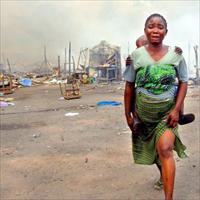DRC: Ambitious conference aims to bring peace to Kivus

Hundreds of Congolese officials and representatives of neighbouring states, civil society and the international community are scheduled to gather in the North Kivu capital of Goma from 27 December for a conference about bringing peace and development to eastern Democratic Republic of Congo (DRC).
But just three days ahead of the meeting, it was unclear whether one of the main players in the North Kivu conflict would attend, while some civil society groups in Goma, the province’s capital, have threatened to boycott the conference.
The ambitious aim of the mammoth gathering is to “reach a cessation of hostilities in the region and put in place a global plan of pacification, security and development in the two provinces,” according to the minutes of a preparatory meeting held in Kinshasa on 16 December.
North Kivu is currently the theatre of clashes between government forces and troops loyal to a renegade general, Laurent Nkunda, who has refused to take part in a national process of military integration, saying he needs to protect the interests of the Tutsi community in eastern DRC.
Hundreds of thousands of civilians have been displaced over recent months and the fighting has in many areas made it difficult, if not impossible, to deliver essential humanitarian aid.
Although the conference organisers insist Nkunda will be present at the conference, his aides said they could not comment as they had received no official invitation.
Human rights abuses
Other armed groups are also active in eastern DRC, all of whom have contributed to the widespread insecurity and all of whom - as well as the regular army - have been accused of committing numerous human rights abuses including rape and killing.
Among these groups are Hutu fighters from neighbouring Rwanda, some of whom took part in that country’s 1994 genocide; and a variety of Congolese militia forces collectively known as Mayi-Mayi.
Eastern DRC was the flashpoint for a 1998-2002 war that sucked in troops from half a dozen nearby countries which backed either DRC government forces or a variety of rebel groups.
Although relative security has since returned to most of DRC, the Kivus remain mired in violence with little sign that deep-seated causes of tension and conflict are anywhere near resolution.
Analyst and author Gerard Prunier summarises these unresolved, “mind-boggling problems” as “ integrating the Rwandaphone minority with the so-called autochthonous [earliest known, indigenous] populations” and getting “the two segments - Hutu and Tutsi - among the Rwandophone group to live peacefully with each other.”
Conference objectives
The specific objectives of the conference include: reaching a common understanding of the causes and consequences of the insecurity; proposing mechanisms for disarming domestic and foreign armed groups; reducing fear and mistrust among different communities in the Kivus; obtaining commitments to peace from all political and military stakeholders; setting up a conflict resolution mechanism; engaging all the active forces in the region in a process of reconstruction and sustainable development; and setting up a special fund for this purpose.
Areas of discussion
According to organisers, discussions will fall under four broad themes. Under “Peace” issues such as justice, the role and responsibility of the state, regional and international repercussions of the conflict, and conflict-resolution will be discussed.
The “Security” theme will look into issues related to the army, the police and other security services as well as foreign and domestic armed groups. Military justice and ending impunity, border surveillance and arms trafficking will also be discussed under this theme.
The plight of those displaced or otherwise affected by conflict will be the focus of the “Humanitarian and Social Issues” theme, as will education, AIDS, violence against women, primary healthcare and humanitarian intervention.
Finally, the “Development” theme will look into management of natural resources and the environment, rehabilitating infrastructure and developing human resources and culture.
Local leaders comment
For the acting head of civil society groups in Goma, Flavien Chiza, the conference is a waste of time as long as fighting is ongoing.
“Shells are exploding now. If the government finds itself unable to put the insurgents out of action they should hold political talks without civil society,” said Chiza.
“They want to spend two million dollars on the conference. I have never seen such assistance from the government to help the displaced return home,” he complained.
Enoch Ruberanga, a member of parliament who represents South Kivu’s Tutsi minority, said the conference would only be worthwhile if Nkunda were present.
“Nkunda must be there if a solution is to be found… Talking about him is not doing him a favour but is a must for everyone in order to find solutions to the security problems,” he said.
“We have to ensure that this umpteenth gathering of Congolese people succeeds with a constructive and sincere attitude. There are many problems that can only be solved by dialogue,” he added.
 Back and Next - Back and Next
Back and Next - Back and Next See Also - See Also
See Also - See Also